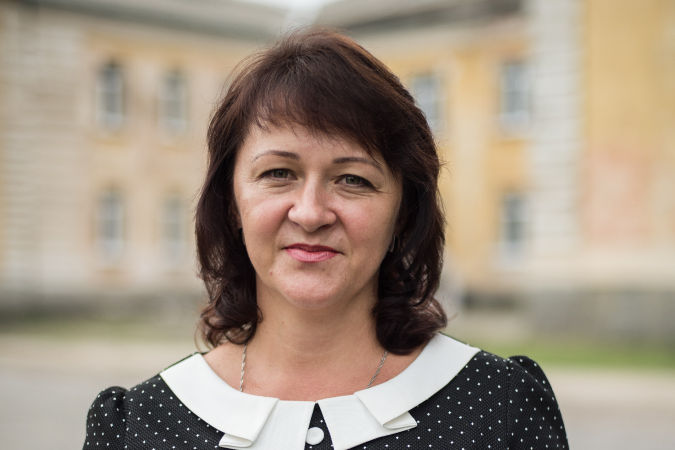From Where I Stand: “It is our responsibility as a community to consider the needs of everyone”
Lilia Kulish is a school principal and a deputy at the local council in Mykolayivka, a small town of about 14,900 people (60% women) in conflict-affected Donetsk region in eastern Ukraine. The school became a shelter for people trying to escape the conflict in the summer of 2014 when anti-government armed groups seized some parts of Donetsk and Luhansk regions in eastern Ukraine, prompting the Government to launch an anti-terrorist operation. After the armed conflict ended in their town, Kulish and other fellow citizens mobilized to rebuild and empower their small community. As a deputy in the council, Kulish advocates for the inclusion of women in decision-making. Her areas of work include addressing the needs of people with disabilities and taking actions for increasing their participation in public life.Date:

“I will forever remember those two days in July 2014 when my school became a shelter for everyone in our village. Children with their parents, teachers and their families and people from neighbouring houses ran to our school, trying to hide from explosions. I felt responsible for them.
When the fighting stopped in our town and our school started working again, as a community, we felt that we were facing new challenges. Students were frightened and they were hiding under desks every time they heard explosions coming from nearby areas. Internally displaced children hosted by our community after fleeing conflict were traumatized. We discussed what to do and organised a kid’s club where teachers and people from the community volunteered to work with children during weekends. Activities included sports, arts and crafts and anything else that would keep the kids busy.
We then felt we needed to do something more significant than organising a kid’s club. This coincided with receiving trainings on community mobilization for empowerment in 2016 [supported by UN Women-UNDP Joint Programme funded by European Union]. The training on how to organise ourselves to advocate for our needs at the local level was a driving force for us. We have organised in a self-help group, which has been active already for a year. After the training from UN Women and the Ukrainian Women’s Fund on gender equality, gender-responsive planning and budgeting and the Convention on the Elimination of all Forms of Discrimination Against Women (CEDAW), we created a Local Gender Coordination Council uniting local authorities and women’s groups at our city council. Honestly, we had never thought of gender equality before the trainings. As a deputy of the city council, I started to pay attention to the share of women in the local government. I am proud to say that now 30 per cent of local deputies in our town are women.
Also, I understood that there are people totally excluded from the community. I focused my work on vulnerable groups like people with disabilities. We realized that no one had up to date statistical data on children, men and women with disabilities in our community. We gathered the data and jointly identified their needs and priorities. Now I am advocating for their needs and priorities to be included in the local programme and budget. There is still a long way before we reach this goal.”
Lilia Kulish, 43, is leading a self-help group “Novatory” (Innovators), mobilized by UN Women and the Ukrainian Women’s Fund to empower women in her conflict-affected community. Community Mobilization for Empowerment is part of the UN Women-UNDP Joint Programme “Restoration of Governance and Reconciliation in Crisis-Affected Communities of Ukraine,” funded by the European Union. UN Women mobilized 58 self-help groups (52 men, 364 women) as part of this programme, to empower conflict-affected women to participate in the decision-making processes that influence their communities. Her work is related to Sustainable Development Goal 10, which aims to reduce inequalities by promoting the social, economic and political inclusion of all and SDG 16, which seeks to ensure responsive, inclusive, participatory and representative decision-making at all levels.